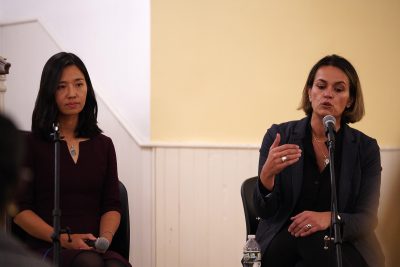
Boston mayoral candidates Annissa Essaibi George and Michelle Wu faced-off on issues ranging from transit to childcare Monday in their final televised debate before the Nov. 2 election.
During the head-to-head debate on WCVB Channel 5, Essaibi George and Wu also discussed climate change, the COVID-19 vaccination mandate and traffic alleviation.
The debate began with a question about the COVID-19 vaccination mandate for city employees — where workers must get vaccinated or submit to regular testing to keep their employment — and how to handle the hundreds of city employees who have so far faced suspensions for failing to comply. Both candidates support mandatory vaccination.
“I stand behind that mandate,” Essaibi George said. “We’ve got a lot of work to do to build trust, to build relationships, to share information and education with our city’s workforce and our city’s residents across the board.”
Wu said she will work toward closing the vaccination gap — making sure there are resources available for everyone to get vaccinated and paid leave for any impacts to help ensure city hall has a fully vaccinated workforce.
When asked what the biggest obstacle to recovery from the pandemic is for Boston businesses, Wu said the challenges the city was facing before COVID-19 — transportation and housing cost — need to be fixed in addition to the economy transformed by the pandemic.
“Our economy has changed forever from this pandemic, and as we’re balancing remote work with the need for businesses to reopen,” Wu said, “we need to support our workers and our businesses in doing so.”
Essaibi George said she plans to use $100 million of the city’s American Rescue Plan Act — the national COVID-19 relief bill — funds for her Equity, Inclusion and Justice Agenda to support small businesses across the city.
Another question addressed how the candidates would seek to support child care programs in Boston.
Wu said the average childcare worker in Boston is paid about one-third of the salary of an elementary school teacher at around $25,000 per year. She also said she will work to tackle the high costs of childcare for residents.
“I’ll continue working with the State House delegation and federal delegation to provide the resources,” Wu said.
Essaibi George suggested that funds from the American Rescue Plan Act should be invested in childcare, emphasizing working in partnership with child care providers — many of whom she said are women of color — suffering due to the pandemic.
“We’ve got to fix the reimbursement process as it relates to subsidized child care and support, especially those women, who are operating small businesses,” Essaibi Geroge said.
A graduate student at University of Massachusetts Lowell asked the candidates how they plan to increase public investments to address climate change issues.
“I’m proud to have introduced the very first city-level Green New Deal anywhere in the country,” Wu said. “Let’s change our stormwater infrastructure funding so that we can start to have the funds assembled for resilient groundwater districts. Let’s ensure that we are working for every single new development project to have funding going to resiliency.”
Essaibi George said she can’t specify the dollar amount that needs to be invested but said action must happen fast, adding that in her first 100 days she will work on a plan to help provide young people with skills necessary for the green economy by bolstering Madison Park Technical Vocational High School.
Wu and Essaibi George disagreed with each other on whether to support Acting Mayor Kim Janey’s decision to withdraw from the harbor front zoning plan.
“I don’t actually back her plan,” Essaibi George said, speaking to the work put in on the project before the decision. “We do have to look at rezoning. As a city, we’ve got to look at some serious master planning, and then look at rezoning and stick to those plans. We have to work in partnership with our city’s residents.”
Wu said she supports Janey’s efforts to ensure the waterfront becomes climate-resilient, accessible, and equity-minded.
In terms of how to alleviate city traffic in their first year in office, both candidates shared their plans.
“The city has power to create dedicated bus lanes, as I’ve advocated for and made sure happened all across the city,” Wu said. “That will help speed up our bus routes, improve the reliability of public transportation [and] also ensure that we are investing in multimodal transit options with bike lanes with pedestrian safety.”
Wu also added that reliable and affordable public transportation must also be part of the conversation, as well as making sure transportation access is a factor in any development projects.
Essaibi George said Wu’s plan for free-fare Massachusetts Bay Transit Authority rides would be too expensive of an investment for the City, although she supports exploring fare-free bus rides, particularly for certain populations.
“I want to understand the work-around freeing the T, and I want to understand that if [Wu] thinks it’s no longer possible to free the T, are we now back stepping from promises you’ve made to the people of Boston?” Essaibi George said.
With early voting and mail-in voting underway, both candidates made their final call for support in their closing statements, with both candidates speaking to how grateful they were to be now days away from the race
The final deadline to apply for a mail-in ballot is Oct. 27, and early in-person voting ends on Friday, Oct. 29.

























































































































